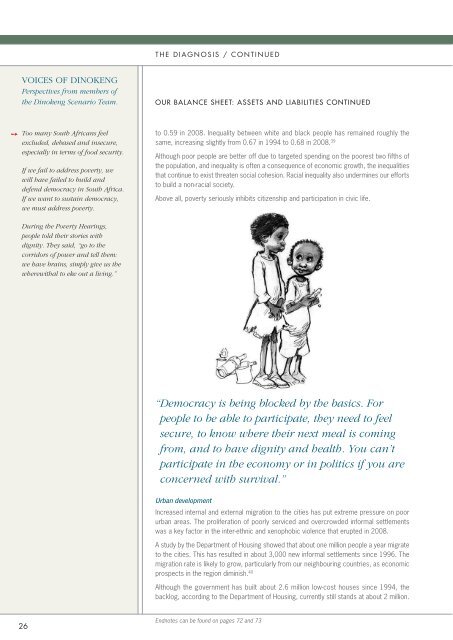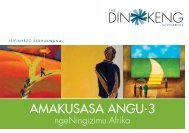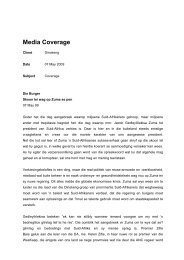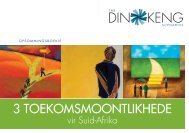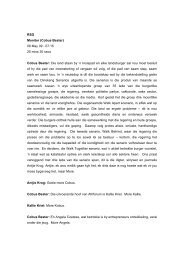Dinokeng Scenarios
Dinokeng Scenarios
Dinokeng Scenarios
Create successful ePaper yourself
Turn your PDF publications into a flip-book with our unique Google optimized e-Paper software.
THE DIAGNOSIS / CONTINUED<br />
VOICES OF DINOKENG<br />
Perspectives from members of<br />
the <strong>Dinokeng</strong> Scenario Team.<br />
OUR BALANCE SHEET: ASSETS AND LIABILITIES CONTINUED<br />
➙<br />
Too many South Africans feel<br />
excluded, debased and insecure,<br />
especially in terms of food security.<br />
If we fail to address poverty, we<br />
will have failed to build and<br />
defend democracy in South Africa.<br />
If we want to sustain democracy,<br />
we must address poverty.<br />
to 0.59 in 2008. Inequality between white and black people has remained roughly the<br />
same, increasing slightly from 0.67 in 1994 to 0.68 in 2008. 39<br />
Although poor people are better off due to targeted spending on the poorest two fifths of<br />
the population, and inequality is often a consequence of economic growth, the inequalities<br />
that continue to exist threaten social cohesion. Racial inequality also undermines our efforts<br />
to build a non-racial society.<br />
Above all, poverty seriously inhibits citizenship and participation in civic life.<br />
During the Poverty Hearings,<br />
people told their stories with<br />
dignity. They said, “go to the<br />
corridors of power and tell them:<br />
we have brains, simply give us the<br />
wherewithal to eke out a living.”<br />
“Democracy is being blocked by the basics. For<br />
people to be able to participate, they need to feel<br />
secure, to know where their next meal is coming<br />
from, and to have dignity and health. You can’t<br />
participate in the economy or in politics if you are<br />
concerned with survival.”<br />
Urban development<br />
Increased internal and external migration to the cities has put extreme pressure on poor<br />
urban areas. The proliferation of poorly serviced and overcrowded informal settlements<br />
was a key factor in the inter-ethnic and xenophobic violence that erupted in 2008.<br />
A study by the Department of Housing showed that about one million people a year migrate<br />
to the cities. This has resulted in about 3,000 new informal settlements since 1996. The<br />
migration rate is likely to grow, particularly from our neighbouring countries, as economic<br />
prospects in the region diminish. 40<br />
Although the government has built about 2.6 million low-cost houses since 1994, the<br />
backlog, according to the Department of Housing, currently still stands at about 2 million.<br />
26<br />
Endnotes can be found on pages 72 and 73


